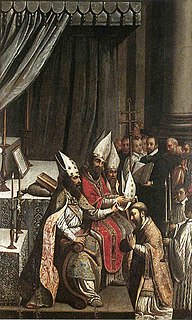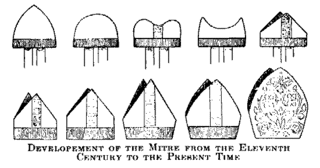Related Research Articles

Apostolic succession is the method whereby the ministry of the Christian Church is held to be derived from the apostles by a continuous succession, which has usually been associated with a claim that the succession is through a series of bishops. Christians of the Roman Catholic, Eastern Orthodox, Oriental Orthodox, Old Catholic, Moravian, Hussite, Anglican, Church of the East, and Scandinavian Lutheran traditions maintain that "a bishop cannot have regular or valid orders unless he has been consecrated in this apostolic succession". These traditions do not always consider the episcopal consecrations of all of the other traditions as valid.

A bishop is an ordained clergy member who is entrusted with a position of authority and oversight in a religious institution.

An episcopal polity is a hierarchical form of church governance in which the chief local authorities are called bishops. It is the structure used by many of the major Christian Churches and denominations, such as the Catholic, Eastern Orthodox, Oriental Orthodox, Church of the East, Anglican, Lutheran and Methodist churches or denominations, and other churches founded independently from these lineages.

In church governance, a diocese or bishopric is the ecclesiastical district under the jurisdiction of a bishop.
Full communion is a communion or relationship of full agreement among different Christian denominations that share certain essential principles of Christian theology. Views vary among denominations on exactly what constitutes full communion, but typically when two or more denominations are in full communion it enables services and celebrations, such as the Eucharist, to be shared among congregants or clergy of any of them with the full approval of each.

An episcopal see is, in a practical use of the phrase, the area of a bishop's ecclesiastical jurisdiction.

The Continuing Anglican movement, also known as the Anglican Continuum, encompasses a number of Christian churches, principally based in North America, that have an Anglican identity and tradition but are not part of the Anglican Communion.

A Christian school is a school run on Christian principles or by a Christian organization.
A vicar general is the principal deputy of the bishop of a diocese for the exercise of administrative authority and possesses the title of local ordinary. As vicar of the bishop, the vicar general exercises the bishop's ordinary executive power over the entire diocese and, thus, is the highest official in a diocese or other particular church after the diocesan bishop or his equivalent in canon law.
A dean, in an ecclesiastical context, is a cleric holding certain positions of authority within a religious hierarchy. The title is used mainly in the Roman Catholic Church, the Anglican Communion, and many Lutheran denominations. A dean's assistant is called a sub-dean.
An episcopal conference, sometimes called a conference of bishops, is an official assembly of the bishops of the Catholic Church in a given territory. Episcopal conferences have long existed as informal entities. The first assembly of bishops to meet regularly, with its own legal structure and ecclesial leadership function, is the Swiss Bishops' Conference, which was founded in 1863. More than forty episcopal conferences existed before the Second Vatican Council. Their status was confirmed by the Second Vatican Council and further defined by Pope Paul VI's 1966 motu proprio, Ecclesiae sanctae.
The Charismatic Episcopal Church (CEC), officially the International Communion of the Charismatic Episcopal Church (ICCEC), is a Christian denomination established in 1992. The ICCEC is a part of the Convergence Movement.
Cathedraticum is a specified sum of money to be paid annually toward a bishop. It is a mark of honour and a sign of subjection to the cathedral church, from which its name is derived.

In the Catholic Church, a bishop is an ordained minister who holds the fullness of the sacrament of holy orders and is responsible for teaching doctrine, governing Catholics in his jurisdiction, sanctifying the world and representing the Church. Catholics trace the origins of the office of bishop to the apostles, who it is believed were endowed with a special charism and office by the Holy Spirit at Pentecost. Catholics believe this special charism and office has been transmitted through an unbroken succession of bishops by the laying on of hands in the sacrament of holy orders.

A pro-cathedral or procathedral is a parish church that temporarily serves as the cathedral or co-cathedral of a diocese, or a church that has the same function in a Catholic missionary jurisdiction that is not yet entitled to a proper cathedral. A pro-cathedral is distinct from a proto-cathedral, the term in the Roman Catholic Church for a former cathedral, which typically results from moving an episcopal see to another cathedral, in the same or another city. In a broader context, the term "proto-cathedral" may refer to a church used by a bishop before the designation of a settled cathedral.

The Episcopal Church, based in the United States with additional dioceses elsewhere, is a member church of the worldwide Anglican Communion. It is a mainline Protestant denomination and is divided into nine provinces. The presiding bishop of the Episcopal Church is Michael Bruce Curry, the first African-American bishop to serve in that position.
A metropolis religious jurisdiction, or a metropolitan archdiocese, is an episcopal see whose bishop is the metropolitan bishop of an ecclesiastical province. Metropolises, historically, have been important cities in their provinces.

The Catholic Church in São Tomé and Príncipe is part of the Catholic Church, under the spiritual leadership of the Pope in Rome and forms the largest religion in the country. A majority of the residents São Tomé and Príncipe adhere to Catholicism.
References
- ↑ Herbermann, Charles, ed. (1913). . Catholic Encyclopedia . New York: Robert Appleton Company.